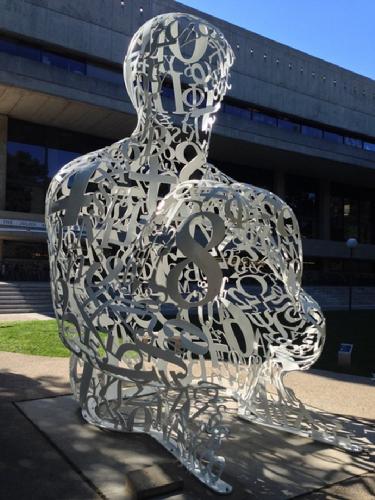本文作者:美国穿越团成员、新东方前途出国咨询有限公司外联部副总监 萧明颢
Day 26: Thursday, September 26, 2013
Days left: 4
Location: Cambridge, Massachusetts
I am a self-professed nerd. I like to learn. I like a challenge. I love books. I love math problems and playing with Excel. I love going to the library and walking out with a pile of books. Part of me still wants to go back to university and get a Ph.D. I geek out on documentaries and non-fiction. My ideal morning is reading and watching the news over a hot cup of cocoa (with marshmallows!). I even looked the part. Think of Betty from the American TV series “Ugly Betty” – that’s what I looked like in high school. A dead ringer. No joke.
Being a ‘Never Ending Radical Dude’ – as my friends and I used to say when we were younger – it was never cool to be this way. But now, with shows like “Big Bang Theory” and “GIee” where formerly academic and art-focused outcasts are the rage of US entertainment and now in hallways across the US and the world, finally, our voices are being heard and our achievements positively acknowledged.
And yet, there was always a place for nerds to fit in, and to belong: College. At college (or ‘university’ if you prefer the British way), I found a place where others felt the same way I did. That I no longer had to hide the fact that I wanted to pursue higher academic accolades and to do it competitively and openly was a wonderful sigh of relief.
Beyond the diploma, the financial investment, the focused years of study, college harnessed this desire for lifelong learning – learning beyond the classroom, beyond the lectures and teachings of our faculty, and beyond the physical realms of the university; the overwhelming feeling that learning is limitless, and yet the excitement that there will always be something new.

The Alchemist sculpture by Spanish contemporary artist Jaume Plensa on MIT's campus between Massachusetts Avenue and the Stratton Student Center. The sculpture consists of mathematical symbols in the shape of a human form. It was commissioned specifically for the sesquicentennial (150th) celebration. Photo taken by Ming-Hao Shiao
In fact, colleges crave students who want to be this way – to demonstrate their desire for academic achievement.
At University of Chicago, they seek students who enjoy learning. Harvey Mudd College and Olin School of Engineering (in Massachusetts near Wellesley) are both institutions where it’s cool to love math, science, and engineering. The University of Pennsylvania seeks students who are interested beyond a single area, but finding multidisciplinary approaches to addressing and solving problems. Saint Louis University seeks students who want to excel academically, yet are dedicated to serving the community.
As we have visited numerous top institutions these past few weeks, it’s hard not to feel this presence of learning. It’s evident in the hallways of famous classroom buildings, in the architecture and history of the buildings, in the achievements of current students and famous alumni, and most evidently when you walk into the libraries.
Ah, the libraries. As the kitchen is the heart of a family home, in my opinion, the library is the hearth of the university.

The Beinecke Rare Book & Manuscript Library at Yale University. One of the world's largest libraries devoted entirely to rare books and manuscripts, it houses one of the few, remaining Gutenberg Bibles. Photo taken by Ming-Hao Shiao
No longer just a physical structure meant for the collection of its hardbound books and journals, libraries are now places of congregation for discussion, analysis, debates, and connection. Truly, the concept of lifelong learning is played out in the volumes and stacks that are held in these immense physical spaces. Just walk in, and you already feel physically small and mentally inept. Works that go beyond years that we can even fathom, yet ready to inspire, to challenge our basic paradigms, and dare I say it so tritely, to connect the past to the present and to the future.
A university is filled with meeting places to talk – walk into any dining hall, café, yard, quad, even bathrooms, and you see, hear, and observe learning happening. Walk around these institutions, and you feel inspired to learn, do, and apply. But it’s beyond the traditional structures of the libraries and classrooms where learning takes place. No longer should we see learning as an end target – a grade, a test exam, or a degree. More and more, intelligence is measured by our desire to learn. To not just be book smart, but to be world focused.
Universities are filled with visitors who are ready and willing to share their expertise, experiences, and lesson. As one Harvard professor told me once, at Harvard, it’s possible to have a full-time job of just attending the lectures and presentations given by its illustrious visitors. Indeed, as a student there, one of my dilemmas was whether or not I should focus on studying, or have a once in a lifetime chance to see world leading experts and thinkers.
In our visit to Harvard University yesterday, we learned that Wynton Marsalis, a foremost jazz musician was performing that evening, followed by the bestowment of the Harvard Humanitarian award to Malala, the brave, young, Pakistani woman who fought and survived her quest for equal education rights. For me, it was unbelievable to have these resources at hand; yet, for a student, it was just another typical day.

Bulletin announcement advertising an upcoming performance at Harvard University featuring world-renown and award-winning jazz artist, Wynton Marsalis. Photo taken by Ming-Hao Shiao.
Learning takes on many forms, many shapes, abstract and concrete. If you are a nerd like I am, you see that college is a place for beginnings or continuation – on one hand, a final ending point, and on another hand, a new beginning to the next step.
更多精彩>>新东方前途出国探寻美国名校之旅